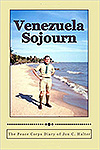Review: VENEZUELA SOJOURN by Jon C. Halter (Venezuela)
 Venezuela Sojourn: The Peace Corps Diary of Jon C. Halter
Venezuela Sojourn: The Peace Corps Diary of Jon C. Halter
Jon C. Halter (Venezuela 1966–68)
CreateSpace
September 2015
264 pages
$12.00 (paperback)
Reviewed by Catherine Bell (Brazil 1966–68)
•
Venezuela Sojourn is a completely unromanticized view of a Peace Corps assignment in Venezuela in the 1960s. All the elements of a typical Peace Corps experience of that era are here — difficulties with the language, attraction to other Volunteers, friction with in-country contacts, parties where you try to figure out who everyone is, the frustration of trying to find something to do, meetings with little result, preoccupations with food and digestion and with deselection and other bureaucratic hurdles against the background of Vietnam, sporadic attempts to find the courage to do the more difficult things that ought to be done.
Committed to a test Peace Corps Scout program, Halter is a well-meaning Volunteer — though no idealist. He recounts some success at teaching phys. ed., organizing Scouting events, and writing for a Scout magazine, despite personal problems with narcolepsy and migraines. He is honest about the balance he finds between service and self-preservation or entropy. “As I walk by the little barrio,” he writes, “I am filled with an urge to move into such a place and see what I can do towards staring a Scout group . . . I fink out and stay home reading.” There is no real story here of deep, passionate or even focused engagement in work. There is limited self-awareness, and the author seems to blame his disappointment on poor Peace Corps planning.
The spine of the book is Halter’s initially half-hearted romance with a local schoolgirl that surprisingly – despite jealousy, conflicts in expectation, and many fights – becomes whole-hearted, and they marry. The reader becomes interested in the problems presented by the young woman’s strong ties to her mother and difficulty in contemplating leaving home, and with Halter’s patient persistence. Of historical interest is his view that “A man has his career to follow as well as his family. A woman, despite what The Feminine Mystique says, centers her life around her husband and her own [new] family.”
Halter reflects that “marrying a Venezuelan (taking for granted, of course, that I was in love with her) would be the perfect way to take back to the States a part of my life here in this country and make it part of my life permanently.” But this is not a book to come to for insight about Venezuelan culture. There is a brief description of a rodeo and of a trip to Mérida, but in the main this is a factual catalogue limited to direct personal experience. “I do not find myself naturally attracted to the Latin culture, I must admit.”
Of note, Halter may hold the record for the greatest number of movies seen during Peace Corps service.
•
Reviewer Catherine Bell is a teacher and writer living in Washington, DC and Chester, Nova Scotia. In Brasília she taught English at the Universidade, at CIEM the university high school, and at the Casa Thomas Jefferson. She has taught in the DC Public Schools and the IB program at Washington International School. She is the author of Rush of Shadows, a novel about Indian genocide in California in the 1850s, and her stories have appeared in numerous literary magazines.
No comments yet.
Add your comment